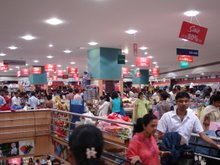Price spiral has no way down
DESPITE timid measures in Budget 07-08 to “moderate” high inflation, the verdict of Indian consumers, much like most marketers, on price rise is a divided one. A majority of respondents (55%) feel their expenses will continue to rise. But equally, 43% say FM’s Budget proposals will bring their expenses down, though it’s anyone’s guess whether small duty cuts and the government’s move to extend the ban on commodity futures in rice and wheat (urad and tur futures were banned late January) on Thursday, will arrest soaring food & other essential goods prices. Delhiites feel most pessimistic on prices. Over 60% feel that the Budget will not be able to curtail price rise. Mumbaikars are also feeling inflation heat. Over 55% of Mumbai respondents feel that Budget measures will not hold help keep a check on their rising expenses. About 59% of Kolkatans and 61% of Hyderbadis also feel that expenses will continue to rise. Ironically, Delhi and Andhra Pradesh are both Congress-ruled states, while West Bengal is ruled by a Congress ally, which may serve as a wake up call to the government. Interestingly, ET’s ‘Post Budget Survey —Mood of The Nation’ shows that there is a divide between Socio Economic Classes (SEC) A and B on Budget’s impact on prices. While 60% of people belonging to SEC A feel that the Budget will not be able to curtail price rise, only 48% of SEC B consumers feel so. Consumers belonging to older age groups are more pessimistic on Budget. While 63% of people between age groups of 41 and 50 feel that inflation control will go in vain, younger consumers (age 18-30) are divided with about 49% tilted to each side. Female consumers, as always are much more worried about price rise in commodities. About 59% female consumers feel that expenses will continue to rise despite budgetary controls. The finance minister is however, trying his best to curtail price rise. Some Inflation reducing measures in Budget which may directly affect commodity prices are reduction in ad valorem component of excise duty on petrol and diesel from 8% to 6%. Import duty cut for non-agricultural products from 12.5% to 10% and cut on most chemicals and plastics from 12.5% to 7.5%, may also help. Biscuits with MRP less than Rs 50 per kg, food mix and instant mixes are now fully exempt from excise. Exemption limit for SSIs is raised from Rs.1 crore to Rs 1.5 crore, which may also help lower prices. The Budget has also reduced duty from Rs 400 per metric tones to Rs 350 per metric tones on cement sold in retail at not more than Rs 190 per bag. But experts feel that this measure will lead to under-invoicing by cement industry which will lead to corruption. Experts also feel that controlling market forces directly is not a very good measure. “The main instrument that the FM has used in the budget is fiscal controls which will show results in three months. Fiscal Deficit at 3.3% of GDP; is the lowest in 25 years. But price controls are measures which should be left to the market to decide,” Dr Amit Mitra, secretary general FICCI said. The survey also shows a deep gulf between respondents on whether this budget will help in a rise in incomes. While 49% feel that the budget will help them earn more, 48.7% feel it will have no impact on salaries. Delhi citizens however emerge as contrarians, again. Most (68%) Delhiites feel that the budget will not help them earn more. Only 29% feel it will help in a rise in their incomes. Thus people may have more money due to a growing economy but supply side constraints may continue to push inflation on the upside, which has touched a new high of 6.73%. ET commissioned the Post-Budget Mood of The Nation poll to TNS India, a leading provider of market information. TNS India conducted the poll using CATI (Computer-Aided Telephonic Interviewing system). Responses of more than 600 respondents were recorded within a span of 24-hours to bring our readers an exclusive peek at what the consumers have to say, post-Budget 2007 announcement. The interview was based on various quantitative (close-ended) questions to measure reactions of the respondents. The poll was conducted amongst adults aged 18 years and above, male & female from SEC A & B categories. Respondents were randomly selected basis the target group, spread uniformly across six cities, Delhi, Mumbai, Bangalore, Kolkata, Chennai & Hyderabad. Parallely, we also posted the same set (six) of questions on etbudget.com. Over 6,200 netizens from India and abroad participated in our online poll.
Courtesy: EconomicTimes
For more detail on Retail India visit: http://www.retailindia.tv
For more detail on Retail India visit: http://www.retailindia.tv



No comments:
Post a Comment